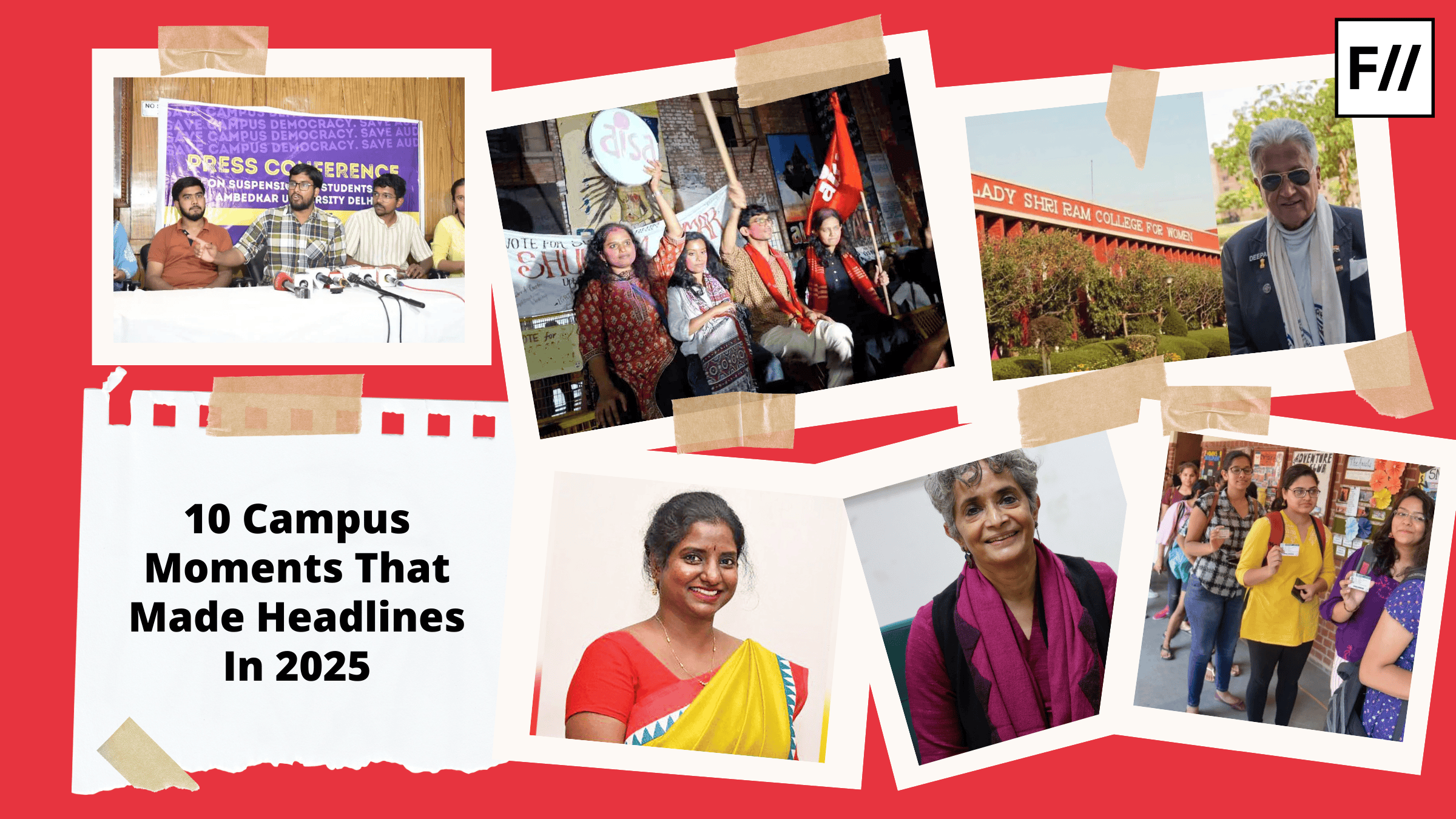It is not, or should not, be surprising to people that conversations about feminism need to be had in every space – including the ones that are seemingly more ‘liberal’. Individuals who identify with the word ‘feminist’ are often derided, and this is not a practice that is unique to one particular space, or a particular college or university in India. But in a very recent and upsetting manifestation of the pejorative use of word feminist, five students of St. Stephen’s College – all women – were nominated for a mock-‘award’ at the Graduation Dinner that is hosted in honour of the graduating class. The award in question was one for the ‘Feminist Fanatic‘ of the graduating batch.
The Feminist Fanatic
A simple Google search for the word fanatic reveals that it is an individual with ‘excessive’ zeal. It is a word often used in combination with the word ‘religious’, where ‘religious fanatic’ stands in for a religious fundamentalist or extremist. So what does it take to be a ‘Feminist Fanatic’ at St. Stephen’s College?

Image courtesy: Google.com
According to one member of the organising committee that drafted the awards, it was to be an honour accorded to those who had “voiced their opinion and have tried to initiate a space where we can talk about equality of the sexes, especially in a college like ours, where there is a curfew for women and lots of hurdles to the freedom of movement in residence for women.” This member requested anonymity, but also acknowledged that the use of the word ‘fanatic’ was probably in poor taste – or, in their words, “insensitive“.
However, the students who were nominated for the award believe that the use of the word ‘fanatic’ is much more than that. “If they were looking for alliteration, why didn’t they use the phrase ‘Fearless Feminist’?” argues Sukrita Baruah, one of the students who was nominated for the award. “It was in line with a series of casual slurs my friends and I face in college, which ranges from “Oh, lets not discuss this now, she’s from the Gender Studies Cell”, to “Don’t be such a feminazi”,” explains René Sharanya Verma , who was also nominated for the award.
The awards presented at this ceremony are supposed to be taken in a humorous vein, and include mentions for those who can drink the most alcohol, are the most athletic, and are the most popular. However, the students who have been nominated have questioned whether one can present a mocking award for alcohol consumption, and a mocking award for fighting for equality.
As has happened on several former occasions, the protesting students have acknowledged that they could receive further backlash for not having a ‘sense of humour’. But says Prerna, who was also nominated, “The problem is that this joke exists outside the space of the Graduation Dinner, it is permanently present in various forms. The ‘fun space’ of Graduation Dinner only serve to legitimise these jokes, even if it is for a day.”
It is more than possible that the students who organised the ‘Feminist Fanatic’ award were entirely well-intentioned, and were attempting to acknowledge the work that these women had done both in their activism and their daily lives. But their choice of words reflects the very systems of oppression that these young feminists are fighting against, and mocks and trivialises the fight for equality that these women have been a part of. Since the award was first announced on Facebook, it was first renamed to ‘Feminist of the Year’, and has now been entirely removed. But the very inception of the award must make us ask – what does it mean to be a feminist in such a seemingly liberal space, and why do we need to talk about it?
Feminism in St. Stephen’s
Several articles have, in the past, cited the sexist practices at universities and the need for feminist discourses in these spaces. Among these, St. Stephen’s College, one of the top-ranked colleges in the country, has often come under the radar for its allegedly sexist ethos and the backlash that the feminists who attend the college face. In 2012, ex-Stephanian and feminist documentary film-maker Saba Dewan wrote about the ‘chick charts’ that were put up during her time in the college between 1982-85, in which women were rated on their looks. She wrote that being a student in the college ‘inadvertently bequeathed’ feminism to its students because of its sexist legacy.
I was a first year student at St. Stephen’s when the article came out, and most of us were shocked and appalled at the very idea of it. As a consequence, several students privately congratulated each other and the college for seeming to have come a long way since then – the majority of the students was female, there were an equal number of hostels for both men and women, and the insidious sexism of the space seemed to have been a long time in the past. A superficial glance at the space made it a seemingly feminist one.
However, several past and present students who have actually occupied the space have come forward to acknowledge that the ‘chick-charts’ do not express a sentiment of a bygone era. A former classmate, Leila Gautam, spoke out about the backlash the campaign received for an open-campus for hostel students – and the then-Principal’s comparison of women and men to “apples and oranges; eggs and stones” in his justification of discriminatory curfews.
The idea of the ‘privilege’ of St. Stephen’s is a recurring theme which is often used to shut down any activism, as we were told to appreciate the dual privileges of being students of St. Stephen’s and accorded hostel facilities. As René puts it, “There is a feeling that the space I occupy is a privilege, and I shouldn’t rock the boat. I do not feel like the ‘Stephanian ethos’ was designed to be inclusive.”
Over the last year, former students watched as an outspoken feminist, Aina Singh, ran for – and won – the Presidency of the Student’s Union Society. She has, to date, been only the second female SUS President that St. Stephen’s has ever had. In a not-surprising turn, her campaign and her Presidency were mired by sexist backlash and allegations about her character. As a consequence of expressing ideas that challenged the systems of power and control, she claims that she was targeted by hurtful and offensive attacks, which ultimately led to her resigning from her Presidency before the completion of her term.
The Need for Talking About Feminism in ‘Liberal’ Spaces

The five students who were nominated for the ‘Feminist Fanatic’ Award.
These issues are not unique to St. Stephen’s. They are, or should be, of concern to feminists everywhere, who feel judged for their opinions, and for almost-feminists who are afraid of being judged and thus distance themselves from the politics because of the connotations of the word ‘feminist’. There is a need for introspection and self-reflection in every space, even the colleges that several of us come from. There is an inherent need to confront the casual sexism in which even our seemingly liberal spaces are so deeply entrenched. As René pointed out, there is a vast difference between theory and praxis – “We discuss feminist history in the classroom and then are supposed to be happy with curfew, we are willing to talk about Boko Haram but not moral policing.” Agrees a frustrated Prerna, “It’s great that we have a Gender Studies Cell, but is sad that people see gender issues as something dealt with only by the Gender Studies Cell, as if it is a recreational hobby.”
In universities where students are supposed to be taught to think and question, the feminist questioning of gendered power and control are necessary and valuable additions to an education, if nothing else. Often, the idea of the liberal space precludes any further discussion within it, because it is seen as unnecessary and redundant. While at St. Stephen’s, we were often led to think that we as we were already so ‘intelligent’, the campus was an automatically liberal space.
Perhaps it is a liberal space in several ways, but it is also one which is so deeply steeped in misogyny that the word ‘feminist’ is used pejoratively. If an education in a ‘liberal’ space is blind to sexism, then what exactly are the ‘liberal’ values that the institution is producing? The idea of the ‘privilege’ of having access to that space further intimidates and prevents students from speaking out against the oppressive practices within them.
“I sometimes feel as if it’s actually harder to speak about casual sexism and be a feminist in St. Stephen’s. We’re told that we have it so much better inside this college than anywhere else,” explains Sukrita. Prerna corroborates, saying that she has been told to go to other DU colleges to see “what women face there“.
Sexism is everywhere, even in our liberal spaces. The recent labelling of feminists as ‘fanatics’ at St. Stephen’s is not a harmless joke, but a reflection of a deeper anxiety, one insidiously rooted in the gendered power relations that underlie all of our spaces. Even, or perhaps especially, our ‘liberal’ ones.
About the author(s)
Bhamini is a Masters student who alternates between working on her dissertation and getting worked up by the state of the world. She writes in an attempt to translate feminist discourses from academia to plainspeak.




